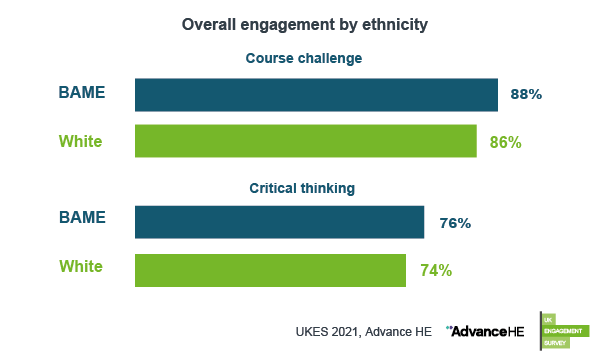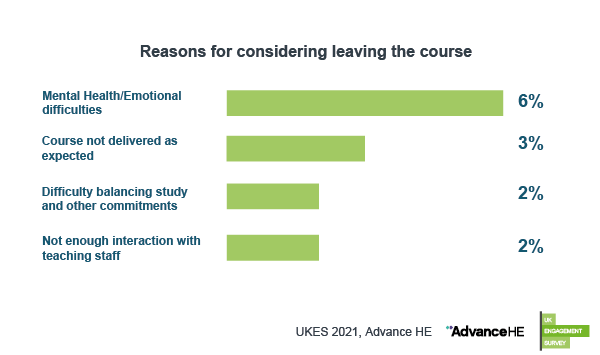UKES 2021 provides us with a comprehensive and detailed overview of key areas such as staff/student interaction, impacts of remote learning caused by the global pandemic and factors linked to retention.
Student engagement and remote learning
The global pandemic caused multiple universities and institutes to adapt and switch to remote or blended modes of teaching, therefore limiting the amount of face to face time with lecturers/tutors within the disciplines. Despite this, students who completed the survey reported that remote learning or a blended approach did not have a negative impact on the acquisition of skills. Positively 85% of respondents stated that a blended approach to learning enhanced their skills in independent learning, and 83% stated their critical thinking skills were developed during the academic year – lifelong skills which are crucial to students beyond their academic journey.
With the ever changing demographics of our learners, and the evolution of technology use in the classroom, universities should be encouraged to adapt and embed technology and meet the needs of students by offering flexibility in modes of delivery and pace and improving accessibility for all students. I feel really encouraged by this finding as we look forward, as many institutions will be offering a blended approach of contact between staff and students during the coming academic year.
Insight event: The student voice: Findings from Advance HE's student experience surveys
Join us on 10 December as we share key findings on student mental health and wellbeing from the UK Engagement Survey (UKES), the Postgraduate Taught Experience Survey (PTES) and the Postgraduate Research Experience Survey (PRES). Find out more and book your place.

Engagement and Underrepresented students
Encouragingly, engagement among Black, Asian and Minority Ethnic students remained higher than for their white counterparts. Students reported higher levels of engagement in such as learning with others, staff student partnerships and interacting with staff, reinforcing the importance of continuously striving to improve engagement with this student groups across all disciplines, and implement strategies to continue to close the attainment gap. Concerningly, disabled students reported decreased levels of engagement compared to the 2020 report. For instance, a 15 percentage point drop was noted in the skill ‘Learning with others’, highlighting the need for universities to respond to the needs of all disabled students, who may have been significantly impacted by the pandemic and remote learning. However, I am encouraged by the ongoing work and dedication of universities to embed an inclusive learning environment and support disabled students as highlighted in the ‘Disabled Students’ Commission Annual Report 2020-2021: Enhancing the disabled student experience’
Supporting student Mental Health
This year, we asked participants for their reasons for considering leaving their programme, and 6% stated that mental health problems were the most frequently given reason. This highlights the need to improve health and wellbeing support for all students, as it could be the key to improving overall satisfaction within the experience and helping the sector to see a reduction in those leaving their programmes. The prevalence in the mental health effects of COVID-19 is of serious concern within the sector. Evidence points to the need for universities to develop a response and recovery plan for students that is multifaceted and addresses mental health problems both during and after the crisis.
